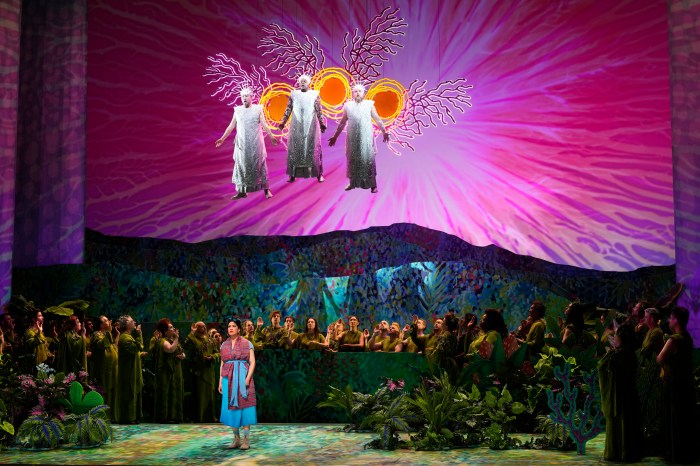Orson Welles, the late American film auteur behind classics such as “Citizen Kane” and “Touch of Evil,” would have turned 100 on Wednesday.
To celebrate his birthday, we’re taking a look at his artistic and cultural legacy in New York City, from his legendary radio broadcast of “War of the Worlds” to his polarizing wheelchair-bound Broadway performance of the title role in “King Lear.”
A restored version of “The Third Man,” in which Welles plays the main character, will open at New York’s Film Forum on June 29.
Broadway’s most provocative 21-year-old producer
In 1936, at the age of 21, the federal government put Welles in charge of his own Broadway theater as part of a program to keep talented artists employed during the Great Depression. Welles was tapped by the Federal Theatre Project to lead a theater company at Maxine Elliot’s Theater at 10 W. 39th St., with actor John Houseman as a partner.
Although it was supposed to be focus on “classical” stage works, Welles decided that wouldn’t attract an audience, so he opened the season with a farce: “Horse Eats Hat,” adapted by Welles and poet Edwin Denby. It was not a classical staging either: action spilled into the audience, and even continued during the intermission. It proved so provocative, the federal authorities sought to censor it. But it only presaged more provocations from Welles’ theater company, soon rechristened as the Mercury Theatre.
Causing mass hysteria with “The War of the Worlds” radio broadcast
Welles also had a significant radio career. But it was his adaptation of “The War of the Worlds,” broadcast from Madison Avenue on the day before Halloween on Oct. 30, 1938, that propelled him to new artistic infamy.
The adaptation of the sci-fi classic mixed straightforward storytelling of the invasion with fake “news bulletins” instead of advertisements, and was so realistic that New Yorkers actually left their homes to find shelter in parks. Thousands of other people called the police, newspapers and radio stations.
“Citizen Kane” premieres at the RKO Palace Theater on May 1, 1941
When William Randolph Hearst, the powerful press tycoon, heard that “Citizen Kane” was largely centered on a character based on him, he was enraged. So enraged that even before the film was released, he ordered his newspapers to undertake a campaign against Welles and the film. Hearst newspapers refused ads for it. The attacks worked. By the time it premiered in May, it flopped commercially. Welles was even booed at the Oscars that year, where the movie was nominated for nine Academy Awards.
An infamous production of “King Lear” with Welles in a wheelchair
Attempting to start a repertory theater on Broadway, Welles set out to stage a production of “King Lear” — in which he would play the lead role — to disastrous results. Unable to secure a prestigious (to his mind) Broadway theater, he had to settle for the nonprofit City Center. Then, before it opened in 1956, he injured one leg and then, on opening night, the other. He was then forced to perform from a wheelchair. It ran for 21 performances and marked the end of his stage career in the U.S.
There’s a bar named after one of Welles’ best known films in NYC
The Third Man bar on Avenue C was named for the 1949 film in which Welles plays the main role of Harry Lime. The thriller, which was directed by Carol Reed, has been named one of the greatest films of all time by various critics. A newly restored version of the film will open at New York’s Film Forum on June 29.

















